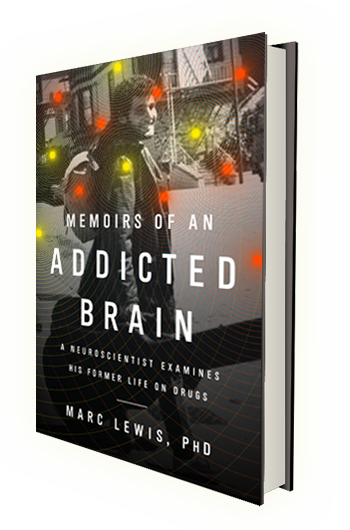 |
| Image source |
As I said before, I like reading books about addiction,
so when I read on twitter about this new book by Marc Lewis, a recovered
addict turned neuroscientist, I immediately ordered it.
The book is Lewis’ biography that starts when he is sent to
a boarding school where he has his first encounter with alcohol. As with all
the other drugs that follow, he describes vividly how he feels upon taking
those first sips and then gulps of alcohol. He enjoys that it makes him feel
different and that for a while it takes away the depressed feelings he has
because of not fitting in well in school. I quickly got carried away by the
story and how well it is written. But then he says:”The cerebral cortex is the
most complex structure on earth”, and that type of neuroscience-arrogance
almost made me put down the book. And he continues to talk about the brain, and
how alcohol, and all the subsequent drugs he takes modify brain chemistry and
hijack the neural circuits used for learning and memory, thereby causing addiction.
At first all this neuroscience talk kind of put me off, mostly because I felt
that it interrupted the story he was telling, but also because I felt that
Lewis sometimes oversimplified things or made too harsh statements just for the
sake of telling a nice story. However, I think for the average lay-person it is
an interesting mix of the story of Lewis’ life and the biology behind what
drugs do to the brain and more importantly, that addiction is a brain-disease
caused by the repeated taking of drugs, and not ‘just’ a couple of bad choices
in life.
The story of his life continues to be very interesting and
well written. He moves to California and continues to experiment with how he
can modify and improve his mood. He first experiments with LSD: “The room
swells and changes in shape and size. It becomes more than a room: an enormous
space broken down into subspaces with gripping dramas unfold with each glance,
each word spoken or withheld, each facial movement. The skin of those faces
decomposes into exotic fabrics made of pores, features, facial hair that seems
to grow while I stare, transfixed, horrified. I don’t need this much detail. I
am overwhelmed by the acceleration itself.”
And later he takes other hallucinogens and eventually starts
to use heroin. Using opioids is what truly gets him addicted, with horrible
withdrawal when he quits for a while. It is also what drives him to start to
break into doctor’s offices and go down a road of caring less and less about
the world around him and more about getting high. I don’t want to spoil the end
of the book, but the fact that Lewis is now a neuroscientist already tells that
in the end he managed to overcome his addiction and change his lifestyle.
No comments:
Post a Comment